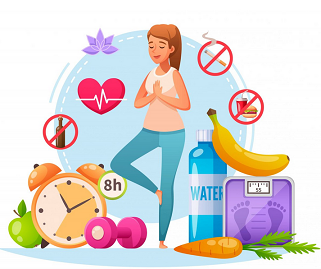How to Managing Blood Sugar Levels Naturally – Managing blood sugar levels naturally is essential for individuals with diabetes or those at risk of developing diabetes. Here are some tips to help manage blood sugar levels naturally:
How to Managing Blood Sugar Levels Naturally
1. Follow a Healthy Diet:
- Eat a balanced diet rich in fiber, whole grains, fruits, vegetables, lean proteins, and healthy fats.
- Choose low glycemic index (GI) foods that have a slower impact on blood sugar levels, such as whole grains, legumes, non-starchy vegetables, and nuts.
- Limit the intake of refined carbohydrates, sugary foods, and beverages, as they can cause blood sugar spikes.
- Monitor portion sizes and spread carbohydrate intake throughout the day to help regulate blood sugar levels.
2. Exercise Regularly:
- Engage in regular physical activity to help lower blood sugar levels and improve insulin sensitivity.
- Aim for at least 150 minutes of moderate-intensity aerobic exercise, such as brisk walking, cycling, or swimming, per week.
- Include strength training exercises at least two days a week to build muscle and improve overall fitness.
3. Maintain a Healthy Weight:
- Achieve and maintain a healthy weight to help regulate blood sugar levels and reduce the risk of developing diabetes.
- Aim for gradual and sustainable weight loss through a combination of diet, exercise, and lifestyle changes.
4. Stay Hydrated:
- Drink plenty of water throughout the day to stay hydrated and support overall health.
- Limit the intake of sugary beverages, such as soda, fruit juice, and energy drinks, which can cause blood sugar spikes.
5. Get Adequate Sleep:
- Aim for 7-9 hours of quality sleep each night to help regulate blood sugar levels and support overall health.
- Maintain a regular sleep schedule by going to bed and waking up at the same time each day.
6. Manage Stress:
- Practice stress-reduction techniques such as deep breathing, meditation, yoga, or tai chi to help manage stress levels.
- Prioritize tasks and set realistic goals to avoid feeling overwhelmed.
7. Monitor Blood Sugar Levels:
- Monitor blood sugar levels regularly using a glucometer or continuous glucose monitoring system.
- Keep track of food intake, physical activity, medication, and other factors that may affect blood sugar levels.
8. Limit Alcohol Consumption:
- Drink alcohol in moderation, if at all, as it can affect blood sugar levels and interfere with diabetes management.
- If you choose to drink alcohol, do so in moderation and with food to help prevent blood sugar spikes.
9. Quit Smoking:
- If you smoke, quit smoking as it can increase the risk of developing diabetes complications and worsen blood sugar control.
11. Consult with Healthcare Providers:
- Work with healthcare providers, including doctors, dietitians, and diabetes educators, to develop a personalized plan for managing blood sugar levels and reducing the risk of complications.
It’s essential to incorporate these lifestyle changes gradually and consistently and to consult with healthcare providers for personalized advice and recommendations based on individual health needs.
More Updates – Click Here





